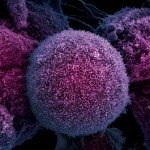Link to Pubmed [PMID] – 19200803
Cell Stem Cell 2009 Feb;4(2):141-54
Telomere shortening is associated with organismal aging. iPS cells have been recently derived from old patients; however, it is not known whether telomere chromatin acquires the same characteristics as in ES cells. We show here that telomeres are elongated in iPS cells compared to the parental differentiated cells both when using four (Oct3/4, Sox2, Klf4, cMyc) or three (Oct3/4, Sox2, Klf4) reprogramming factors and both from young and aged individuals. We demonstrate genetically that, during reprogramming, telomere elongation is usually mediated by telomerase and that iPS telomeres acquire the epigenetic marks of ES cells, including a low density of trimethylated histones H3K9 and H4K20 and increased abundance of telomere transcripts. Finally, reprogramming efficiency of cells derived from increasing generations of telomerase-deficient mice shows a dramatic decrease in iPS cell efficiency, a defect that is restored by telomerase reintroduction. Together, these results highlight the importance of telomere biology for iPS cell generation and functionality.

